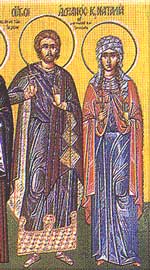Adrian and Natalia of Nicomedia
| Adrian and Natalia of Nicomedia | |
|---|---|

Saint Adrian and his wife, Saint Natalia
|
|
| Martyrs | |
| Died | 4 March 306 Nicomedia |
| Venerated in |
Roman Catholic Church Eastern Orthodox Church |
| Major shrine |
Argyropolis near Constantinople; Geraardsbergen, Belgium; Church of St Adriano al Foro, Rome |
| Feast | 8 September (historic Julian Calendar) 26 August (Revised Julian calendar) 1 December |
| Attributes | depicted armed, with an anvil in his hands or at his feet |
| Patronage | plague, epilepsy, arms dealers, butchers, guards, soldiers |
Saint Adrian (also known as Hadrian) or Adrian of Nicomedia (died 4 March 306) was a Herculian Guard of the Roman Emperor Galerius Maximian. After becoming a convert to Christianity with his wife Natalia, Adrian was martyred at Nicomedia.
Adrian and Natalia lived in Nicomedia during the time of Emperor Maximian in the early fourth century. The twenty-eight-year-old Adrian was head of the praetorium.
It is said that while presiding over the torture of a band of Christians, he asked them what reward they expected to receive from God. They replied, "Eye hath not seen, nor ear heard, neither have entered into the heart of man, the things which God hath prepared for them that love him" (1 Corinthians 2:9). He was so amazed at their courage that he publicly confessed his faith, though he had not himself yet been baptized. He was then immediately imprisoned himself. He was forbidden visitors, but accounts state that his wife Natalia came to visit him dressed as a boy to ask for his prayers when he entered Heaven.
The executioners wanted to burn the bodies of the dead, Natalia and her husband Adrian, but a storm arose and quenched the fire. Natalia recovered one of Adrian's hands.
The accuracy of the recorded story has been questioned. Some sources state that there were actually two Adrians martyred at Nicomedia, one under Diocletian, and one under Licinius.
In the Eastern Orthodox Church, Saint Hadrian shares a feast day with his wife on August 26 (Revised Julian Calendar and/or Gregorian Calendar), or on 8 September (some Orthdox Churches still use the historic Julian calendar); he also has feast days alone on 4 March. In the Roman Catholic Church he is venerated alone, without his wife, on 8 September.
...
Wikipedia
